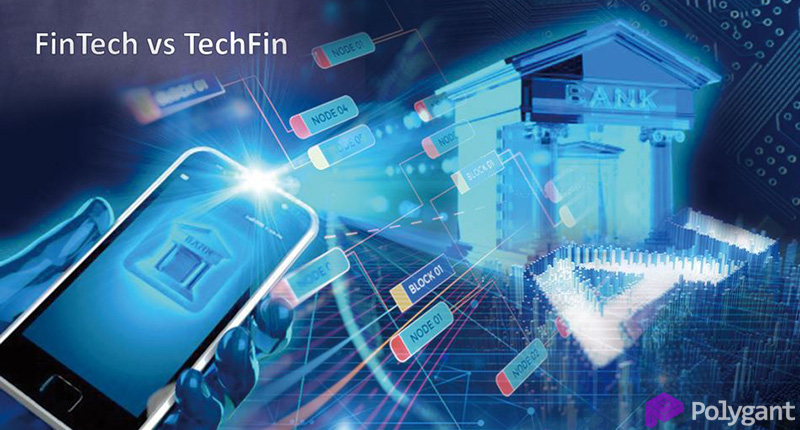Digital technologies, which developers are actively introducing into the financial system, have provided the world with some new concepts: first ‘fintech’ and later ‘techfin.’ We will try to establish what the difference between them is and if it really exists.
Main differences
There actually is a difference. It can be found in two aspects:
- The nature of the service.
- The tasks.
FinTech is both the financial technologies themselves and a segment of the financial sector. This includes ‘fintechs’ — companies and startups which exclusively provide financial services using digital technologies. For example, online or mobile banking services, which are offered by most banks.
Among British banks which offer fintech services are Barclays, HSBC, Lloyds Bank, The Royal Bank of Scotland and many others. However, the UK has plenty of digital-only banks — as many as 46 fintech companies, such as Aldermore, Atom, Monese, Monzo, Redwood, Revolut, Starling, Tandem, and Thinkmoney. Their counterparts are popular in the rest of Europe: Bunq (Netherlands), Fidor and N26 (Germany), Hello Bank (Belgium), and Openbank (Spain).
It is worth noting that half of all online banks and neobanks are not financial institutions as they do not have the appropriate licence. They work in partnership with traditional banks, while some are even subsidiaries of them.
In mid-2018, businessmen came up with an inversion — TechFin. Funnily enough, it does not mean ‘technological finances’ (there is no such concept). This acronym covers only a small segment of the IT industry. ‘Techfins’ are technological companies which offer financial services in addition to their main technology-based products. In this case, the financial products are technologically advanced, making them more convenient for users.
Corporations such as Google, Amazon, Apple and Facebook in the US as well as Alibaba and Tencent in China are now considered techfins. They cannot be called financial companies, like fintechs or digital banks, because they operate without support from traditional banks and their primary activities are not finance-related. In this way, companies which start out as IT companies and later decide to launch a financial service can be considered techfins.
The difference in tasks undertaken by fintechs and techfins is also evident: the former try to perfect the preexisting instruments of the financial sector, while the latter strive to use the newest technologies to create an alternative to regular financial services.
Expert opinion
Many financial experts and businesspeople have expressed their opinions on the differences between these two concepts. Jack Ma, the founder and former chairman of Alibaba Group, believes that fintech is online banking — when financial organisations operate on the Internet, while techfin is internet money created by inventors and not bankers.
“Two big opportunities are looming in the future of the financial sector. One is online banking, where all the financial institutions come online; the other is internet finance, which is run exclusively by outsiders,” said Jack Ma.
Chris Skinner, the founder and chairman of Financial Services Club, identifies almost the exact same differences. He believes that techfins are constantly working with new technologies, studying and perfecting them, while fintechs are striving to use technology to improve financial operations and make them cheaper.
“Techfin companies start with technology figuring out how it can be used with finance. In contrast, fintech companies start with existing financial structures trying to make them cheaper and faster with technology. I liken it to fintechs are making horses faster whereas techfins are working with aircraft,” said Chris Skinner.
Fintech and techfin — partners or rivals?
Ideally, fintech and techfin companies would be able to create an environment where they could cooperate and perfect each other’s financial mechanisms, and this cooperation would benefit both parties. In reality, however, technological companies are fighting a brutal war for the financial market.
This is evidenced by five facts, established by Arun Krishnakumar, a financial consultant from London. He included them in his article for Daily Fintech:
- In China, Alipay and WeChat provide citizens with most financial services, and it is more convenient for the population to use their services than to open an account in a regular bank.
- IBM is designing its own blockchain-based payment system — World Wire — to enter the money transfer market.
- Facebook has developed its own digital currency — Libra.
- Apple has released a credit card called Apple Card.
- Alibaba has launched Alipay in the UK.
The columnist considers these facts sufficient to prove the existence of tough competition between technological and financial companies, including banks. However, it is not all so simple: Amazon and Google are still looking to cooperate with the banks, unlike Alibaba and Tencent.
The strong suits of techfin companies
The tech giants have huge potential in the financial sector thanks to their strong suits:
- they have enormous databases and the technical capabilities to process and analyse them;
- they are effective and flexible in their innovations;
- they know consumer behaviour;
- they have their clients’ trust and brand loyalty.
Therefore, in order to somehow compete with them, traditional financial institutions must not only develop online services, but also intensify their work on digital marketing. This will help them to increase their client’s loyalty and popularise their brand on the Internet.


 Telegram
Telegram 